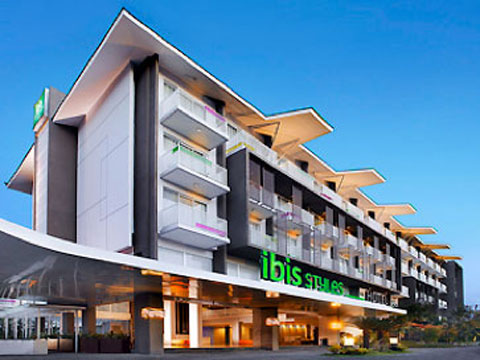1st ISF workshop in the Asia Pacific Region to utilize BrainMaster’s new BrainAvatar software in exotic Bali, 80361 Nus Dua Indonesia
Registration for this workshop is now closed. If you would like to be notified for future runs of the workshop, please contact us to register your interest.
Learn the Ins & Outs of Infra-slow Fluctuation (ISF) Training for BrainMaster Discovery and Atlantis amplifiers.
Come join seasoned practitioner and trainer, Mark Llewellyn Smith, LCSW, BCIA-EEG, in Bali Indonesia, as he shares the framework for using ISF and the hands-on experience for finding and setting the Optimum Frequency (OF). This will be the first workshop in the Asia Pacific Region to utilize BrainMaster’s new Avatar software.
Infra-slow Fluctuations, first identified by Russian researchers in the 1950s (Aladjalova, 1964) and later corroborated by (Joe Kamiya 1973) and others, became a signal of significant interest to researchers recently.
Research suggests that the infra-slow signal underlies the excitability dynamics of cortical networks (Vanhataloo, 2004). Further, it appears to be a direct electrophysiological correlate for slow fluctuations in human psychophysical performance (Monto 2008). Most recently research has suggested that very slow oscillations are associated with the Default Mode Network of the human cerebral cortex and appear to be related to ADHD symptom status (Helps, Broyd et al. 2009, Helps, Broyd et al. 2010, Broyd, Helps et al. 2011, Tye, Rijsdijk et al. 2012). Recent research is beginning to shed light on why this low energy is so important. These lower frequencies may represent a matrix in the brain subserving blood, neural, and glial activity.
This year ISF researchers in Finland (Palva and Palva 2012) have theorized just that:
“We conclude that ISFs in electrophysiological recordings, BOLD signals, neuronal activity levels, and behavioral time series are likely to reflect the same underlying phenomenon; a superstructure of interacting and transiently oscillatory ISFs that regulate both the integration within and decoupling between concurrently active neuronal communities.”
Addressing this “superstructure” with ISF training is the likely reason we often see rapid, positive, behavioral change in our clients as we strengthen the connection between neuronal communities. This is confirmed by our QEEG data that shows clear positive impact on coherence, phase, and amplitude.
This workshop will demonstrate the process of infra-slow fluctuation training in clinical practice. The process pivots on the determination of an optimum frequency (OF) that is trained for each individual client. In the didactic portion of the workshop the OF determination process will be demonstrated along with a discussion of the equipment and optimal signal processing requirements necessary to accomplish effective training.
The Avatar software allows functionality previously unavailable to the ISF clinician. From observing bipolar training in a referential montage to adding Z scores either in a training or monitoring capacity. The new software also allows for concurrent ISF and sLORETA training and real time sLOREATA analysis with the Live LORETA Projector. Avatar has allowed for simultaneous 19 channel recording and ISF training. This innovation that has provided a window on the mechanism of bipolar ISF training will be discussed.
The value of QEEG in predicting treatment responders, treatment planning, and determining treatment outcomes will be established. Case studies with pre/post-QEEG analysis will be presented. The practicum portion of the course will span two full days for all practitioners to have several opportunities for hands on training in the optimization process, in evaluating outcomes, and in adjusting treatment accordingly. The emphasis on the workshop practicum will provide students with the necessary tools to integrate ISF training in clinical practice.
Workshop Schedule of Events
Day One | Friday | 9:00 pm to 5:00 pm
Clinical and technical overview including live demonstrations of Infra-Slow-Fluctuation training and initial hands-on component.
Day Two and Three | Saturday & Sunday | 9:00 am to 5:00 pm
- Hands on training. Please bring your computers and amplifiers. If you don’t own a DC coupled amplifier, please don’t let that stop you from attending. We will team you up with someone who does.
- The use of QEEG analysis for evaluating ISF candidates, treatment response, and beginning placements.
- Presentation of Pre/Post QEEGs and neuropsychological tests of ISF trained clients with a variety of presentations including affective disorders, autism, PTSD, ADHD, and insomnia.
Workshop Info
Registration for this workshop is now closed. If you would like to be notified for future runs of the workshop, please contact us to register your interest.

Venue:
Ibis Styles Bali Benoa, Jalan Pratama, No 57A, Benoa, Bali, 80361 Nusa Dua, Indonesia (Seminar Room)
Date:
22nd – 24th March 2013 (Fri – Sun)
Time:
9am – 5pm
Accommodation:
Special discounted room rate: 650,000 rupiah (US$70) twin sharing with breakfast included.
Trainer:
Mark L. Smith, CSLW, BCIA-EEG (USA)
Fee:
US$650 early bird until February 15 2013
From 16th February 2013, Fee will be US$750
US$400 for those who have attended previous ISF workshop
(Fee is inclusive of lunch and tea-breaks)
Payment
Credit Card:
Please register at https://www.bec-eeg.com
Cheque:
Make cheque payable to:
Brain Enhancement Centre Private Limited
Bank Transfer:
Make payment to DBS Current Account:
011-9022981, Bank Code: 7171, Swift Code: DBSS SGSG
